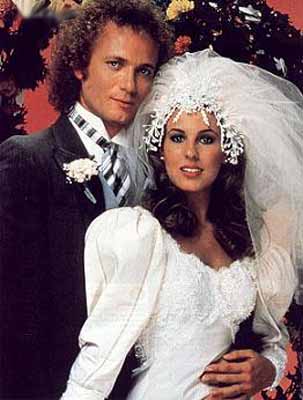Catherine Earnshaw comes off as a weak woman because she is so strong in spirit that she physically cannot handle her own hurricane of emotions. Heathcliff is
 hard-headed; he has formed his shell to such an extreme, that he can only be with Catherine when she is dead. Whatever story revolves around these two, whoever becomes involved with them, whatever lies in their path, is destined to be swept into the fire of drama that makes Wuthering Heights a classic.
hard-headed; he has formed his shell to such an extreme, that he can only be with Catherine when she is dead. Whatever story revolves around these two, whoever becomes involved with them, whatever lies in their path, is destined to be swept into the fire of drama that makes Wuthering Heights a classic.What then do soap operas have to do with this? If you do your daytime ironing in front of the TV, or have ever been channel surfing and have stopped to briefly giggle at General Hospital or One Life to Live, you are guaranteed nonstop, hard-reality-filled drama. Bronte's story takes place in the fictional world, but pulls out no stops to bombard its characters with some of the harshest realities people can experience. Heathcliff is an orphan, he is eventually dejected by Hindley, Hindley is an abusive alcoholic, he also raises an evil spawn, Hareton, Heathcliff can never win Catherine because she is only attracted to refined men, she marries one, Heathcliff leaves in a passionate fit, Catherine, in a swoon, falls deathly ill, never to recover, Heathcliff marries Catherine's refined husband's sister as a stab at Catherine...I won't go on. Soap operas thrive on plots such as these, open-ended and malleable, because they present real human dramas; the secrets between loved ones and families that can never be exposed, what goes on behind closed doors. Bronte's drama manifested in todays soaps comes out to be a never ending cycle of missing brides, twins who steal each other’s identities, abortions, birth defects, job loss, alcoholism and drug addiction, crimes of all sorts, fatal car accidents, fatal diseases, miracle cures of fatal diseases, and more. The characters no longer seem to be agreeable when the facade is cast away and we must watch them flounder in their own bad decisions.
The insular nature of the setting is just like the small worlds created on soap operas. The suffocating world created by Wuthering Heights and Thrushcross Grange only presents the
 characters with so many options; they've grown up together, they must marry each other, they must die together. Soap opera characters are locked into small worlds because, when everyone is packed into a small town together, things are bound to happen; think of bacteria growing in agar. With characters that refuse to resolve personal and relational issues, a small, inescapable world can be killer.
characters with so many options; they've grown up together, they must marry each other, they must die together. Soap opera characters are locked into small worlds because, when everyone is packed into a small town together, things are bound to happen; think of bacteria growing in agar. With characters that refuse to resolve personal and relational issues, a small, inescapable world can be killer.So we may see Victor and Catherine as wussies, Heathcliff as insufferable, and soap operas as ridiculous, but they are merely concentrated presentations of the everyday dramatics of life and the emotional turmoil which inevitably comes with them. If you pretend that you don't want to pick up those celebrity tabloids while you're waiting in line at the grocery story, you're lying. We are fascinated with the secret underbellies of our fellow humans, soap operas and Emily Bronte simply made art of it.
“The insular nature of the setting is just like the small worlds created on soap operas. The suffocating world created by Wuthering Heights and Thrushcross Grange only presents the characters with so many options…”
ReplyDeleteMegan, you brought up this issue of setting in class, and as I continue to read the book, your point lingers with me. I’m currently at the point in the Wuthering Heights when Edgar finally allows Cathy to see Linton but only on the margins of their property. Because their world is extremely small and limited, they are forced to create physical margins as a new setting. However, this margin proves still haunted by the negatives feelings of both Wuthering Heights and Thrushcross Grange as their meetings finally result in Ellen and Cathy’s capture and imprisonment at Wuthering Heights. Why not hang in Gimmerton? Why not somewhere else? Bronte clearly plays with limited settings throughout the book as a means of magnifying—not dramatizing—the characters’ actions, thoughts, and feelings. As to why this magnification exists, I’m not sure as of right now.